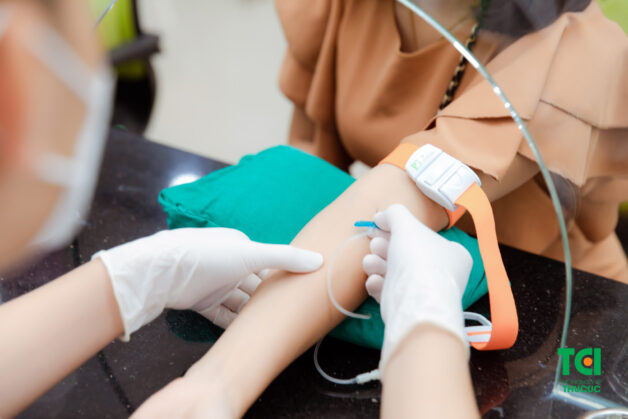Dengue fever remains a prevalent disease without a preventive vaccine, posing a yearly threat to individuals worldwide. The absence of a vaccine raises concerns about the potential life-threatening consequences if the disease is not managed properly. Therefore, it is crucial to understand and implement appropriate measures when diagnosed with dengue fever. This article outlines common symptoms, dangerous complications, and essential actions to take when facing this mosquito-borne illness.
1. Common Symptoms of Dengue Fever
The symptoms of dengue fever vary depending on the severity and stage of the disease. In mild cases, patients may experience the following:
– Abrupt and sustained high fever ranging from 39 to 40 degrees Celsius.
– Prolonged fever lasting 4 to 7 days with no signs of temperature reduction.
– Intense headaches and pain behind the eyes.
– Body aches, joint pain, and muscle pain.
– Nausea and vomiting.
– Reddish rashes and skin eruptions.

Monitor the body temperature of dengue fever patients at least 3 times a day
In severe cases, additional symptoms may emerge, including bleeding manifestations such as nosebleeds, gum bleeding, bruising, vomiting blood, and black stools. Abdominal pain, nausea, cold extremities, restlessness, and potential life-threatening conditions may occur if not promptly treated.
2. Dangerous Complications of Dengue Fever
During the initial 4-7 days, patients experience symptoms like high fever, severe headaches, nausea, rashes, and body aches. Failure to detect and treat the disease promptly can lead to dangerous complications:
– Reduced platelet count causing fatigue and weakness, necessitating careful monitoring and blood tests.
– Hemorrhagic manifestations, such as bleeding gums, nosebleeds, and uncontrolled bleeding, leading to fatal outcomes.
– Continuous bleeding disrupts the circulatory system, resulting in heart and kidney complications. Insufficient blood pumping by the heart may lead to pericardial effusion.
– Pulmonary complications, including fluid accumulation in the lungs, pose a severe threat to the patient’s life.
3. Essential Measures When Diagnosed with Dengue Fever
Patients can receive home-based care following consultation, examination, and treatment planning by a specialized physician. To prevent dangerous complications, caregivers must closely monitor and promptly address any unusual signs.
3.1. Symptomatic Treatment
In cases of high fever, patients should take antipyretic medication, specifically paracetamol. It is crucial to avoid self-medication with other drugs like aspirin, analgin, or ibuprofen, as they may exacerbate complications.
3.2. Appropriate Nutritional Support
Dietary requirements for dengue patients vary based on the disease stage:
– Liquid diets are suitable during the initial high fever phase.
– Light meals are recommended as the fever subsides and recovery begins.
– Normal diets are encouraged for patients in the recovery phase, ensuring an adequate intake of nutrients, vitamins, minerals, proteins, and fats to boost immunity and support platelet production.
Patients should prioritize foods that enhance platelet production, such as water, fruit juices, coconut water, and a balanced diet.

Fruit juices, especially citrus fruits, are the best source of vitamins, helping to get over weakness.
3.3. Care and Monitoring
Caregivers should diligently monitor the patient’s body temperature, urine output, abdominal pain, vomiting, and other symptoms. Noteworthy signs, such as lethargy, difficulty breathing, cold extremities, and bleeding manifestations, require immediate medical attention.
– Patients should rest in bed, avoid mental stress, and refrain from cold-water baths. Quick showers or wiping the body with warm water is preferable.
– Patients must take prescribed antipyretic medication and adhere to scheduled follow-up appointments.

Get examined and use medicine to treat dengue fever as prescribed
In conclusion, the outlined measures are essential when dealing with dengue fever to mitigate the risk of severe complications. Upon observing dengue symptoms, immediate medical attention is crucial for accurate diagnosis and proper treatment planning. It is imperative to refrain from self-medication to prevent further health complications.








